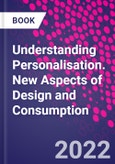Understanding Personalization: New Aspects of Design and Consumption addresses the global phenomenon of personalization that affects many aspects of everyday life. The book identifies the dimensions of personalization and its typologies. Issues of privacy, the ethics of design, and the designer/maker's control versus the consumer's freedom are covered, along with sections on digital personalization, advances in new media technologies and software development, the way we communicate, our personal devices, and the way personal data is stored and used. Other sections cover the principles of personalization and changing patterns of consumption and development in marketing that facilitate individualized products and services.
The book also assesses the convergence of both producers and consumers towards the co-creation of goods and services and the challenges surrounding personalization, customization, and bespoke marketing in the context of ownership and consumption.
Please Note: This is an On Demand product, delivery may take up to 11 working days after payment has been received.
Table of Contents
PART 1 Personalisation: expectations, challenges and reality
1. The contemporary phenomenon of personalisation
2. Personalising consumption or consuming personalisation
3. The ethical dilemma of personalisation
PART 2 Digital personalisation
4. Delivering personalised, digital experience
5. Predictive personalisation: are we watching or being watched?
6. Personalisation: what the experts think
PART 3 Tailor personalisation
7. Individualisation of markets: towards personalisation
8. Consumers and producers: whose personalisation is it?
9. Customisation and co-creation: an evolving complexity
PART 4 Personalisation by material engagement
10. Personalisation and the category of the person
11. Persons consuming
12. Persons repairing: reficio ergo sum
PART 5 Back to the personalised future
13. Lessons learned: personalising the future, personalising ourselves








